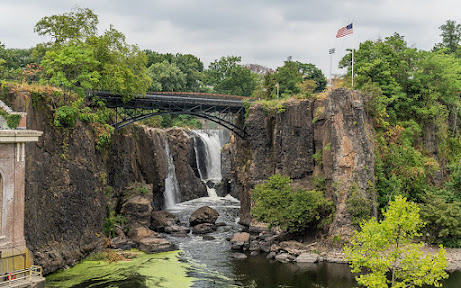 |
| Williams in his 1921 passport photo |
It's the birthday of poet William Carlos Williams, born in Rutherford, New Jersey, on September 17, 1883. He the first of two sons of an English father and a Puerto Rican mother of French, Dutch, Spanish, and Jewish ancestry. Growing up in New Jersey, I was interested in Jersey poets when I was in high school and discovered Williams through a used copy of his Selected Poems that I found at a yard sale. Seeing that it was his birthday, I took that old paperback off my shelf and read some breath into his poems again.
When Williams was in high school he decided he wanted to be both a poet and a doctor and saw no clash between the two professions. He pursued both vocations with equal passion for the rest of his life. He wrote poems on the back of prescription slips, and he drew from the passions and pain of the patients he visited in the Hell's Kitchen neighborhood of New York City and, later, in his practice in Rutherford.
In my high school days, I fell under the spell of his contemporaries Ezra Pound and T.S. Eliot and poetry that "sounded like poetry" and that took some digging to understand. I found Williams' poems oddly simple and almost "not poetry."
Apparently, Williams admired those poets too but found them "too European." But along with Pound and H.D., he is considered a leading poet of the Imagist movement. It became his aim to capture a uniquely American voice. He wanted to use the plain speech of the local people whose lives he became part of in his medical practice.
In the second half of my poetic life, I lost interest in the most "poetic" poets and found my reading and writing closer to Williams, though more narrative in form.
The sixteen-word unrhymed poem from 1923 below is among Williams’ most famous poems.
so much depends
upon
a red wheel
barrow
glazed with rain
water
beside the white
chickens
"The Red Wheelbarrow" should be called ‘XXII’ since it’s the 22nd poem to appear in Williams’ 1923 collection Spring and All and that is how it was listed in that collection - but everyone refers to it as "The Red Wheelbarrow." When I first became really interested in Williams, this poem intrigued me. It is so simple and yet its "meaning" is not so easy to explain. That wheelbarrow is a metonym for something greater. The fact that it is "glazed" by rainwater is very much "Imagist."
Williams' poetic reputation was slow to form because it was a time Eliot's "The Waste Land" was considered the pinnacle of English poetry. It was in the 1940s and beyond that Williams gained wider recognition, and his five-volume poem Paterson, (1946 - 1958) is considered his masterpiece.
It is a much more complex and difficult poem on first reading. (It is available online if you can read text on a screen - I can't, so I prefer to read it on the paper page.) Yes, in high school, I took a copy of it to read beside the Great Falls of Paterson, New Jersey feeling very much a poet myself. Corny Romanticism, I suppose, but I still visit those falls quite regularly, without his book but usually with my notebook and camera.
But another of his best-known poems is this very short one that reads like a note left for his wife.
This Is Just To Say
I have eaten
the plums
that were in
the icebox
and which
you were probably
saving
for breakfast
Forgive me
they were delicious
so sweet
and so cold
The poem is very much "modernist and imagist" and so we look at it as dealing with temptation, guilt, and life's simple pleasures as he apologizes and yet doesn't apologize.
This post is not to say that all of his poems are so simple on the surface or difficult to understand as poems.
Take this opening of his straight ahead and rather erotic poem "Arrival."
And yet one arrives somehow,
finds himself loosening the hooks of
her dress
in a strange bedroom--
feels the autumn
dropping its silk and linen leaves
about her ankles...
And I do love the idea of and this line "Who shall say I am not the happy genius of my household?" from his poem "Danse Russe."
He certainly was a prolific poet. His Collected Poems take two volumes.
Visit our website at poetsonline.org


No comments:
Post a Comment
* * All comments must be approved by the site administrator before appearing in order to prevent spam.